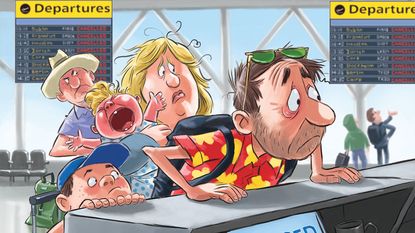What’s gone wrong in the aviation sector?
Airlines and airports seem woefully unprepared for the rebound in demand for flights after the pandemic. Why? And when will the outlook improve?

Travellers around the world are struggling with post-pandemic disruption at airports. The worst of it is here in Europe, creating chaos for millions of Britons desperate for a holiday. While Asia’s travel industry is still navigating Covid-19 and America suffers from a shortage of pilots, it is Europe where various kinds of turmoil have “converged to inflict maximum pain on consumers”, said Bloomberg.
Last week, Heathrow announced a daily cap of 100,000 on passenger numbers until 11 September. Emirates, the Dubai-based airline, blasted it for fomenting “airmageddon”.
London’s airports are among the worst affected in Europe. Between the start of April and the end of June, 8,200 flights were cancelled at Heathrow and 6,800 at Gatwick. That compares with 8,600 at Frankfurt and 6,400 at Munich. But outstripping them was Amsterdam’s Schiphol airport, with 14,200 cancelled flights.
Subscribe to MoneyWeek
Subscribe to MoneyWeek today and get your first six magazine issues absolutely FREE

Sign up to Money Morning
Don't miss the latest investment and personal finances news, market analysis, plus money-saving tips with our free twice-daily newsletter
Don't miss the latest investment and personal finances news, market analysis, plus money-saving tips with our free twice-daily newsletter
Meanwhile France, Spain, Italy and Portugal are all doing relatively well, says aviation-data group OAG.
What’s causing the problems?
The chaos is down to “tourism rebounding unexpectedly fast” and crashing into an underprepared aviation industry, says The Economist. Deprived of holidays for years, people are “revenge travelling” and the weak euro is helping to boost demand from outside the eurozone.
The disruption to aviation is a highly visible example of a wider structural issue: businesses struggling to get fully staffed owing to near-full employment across Europe. The same problems seen at airports are also evident in care homes, hotels and “other places that need a lot of unskilled staff. They simply get less attention.”
Unemployment is at 6.6% in the eurozone, the lowest since the single currency was launched two decades ago. In Germany it is just 2.8%. The willingness of Poles or Bulgarians to fill the gaps has slumped, since they can now find plenty of good jobs at home.
Any other factors?
The disruption has been exacerbated by a series of strikes. Soaring inflation and pay demands have in recent weeks seen strikes involving everyone from firefighters and air-traffic controllers to cabin crew, cleaners and baggage handlers – across European countries from Scandinavia to Italy.
In addition, Russia’s war in Ukraine is a factor in restricting available airspace across the continent. According to Lufthansa, the war is causing bottlenecks in the skies that have contributed to flight delays and disruption.
All these factors have left airlines and airports struggling to meet demand, especially those airlines, including British Airways and Lufthansa, that slashed their workforce at the start of the pandemic. The German carrier cut around a third of its workforce to 100,000 people at the height of pandemic restrictions, leaving it short of cabin crew, ground staff and pilots as demand for travel recovers.
“Did we drive some savings too hard? No doubt,” said CEO Carsten Spohr earlier this month, as he announced 3,100 cancellations for July and August, or around 4% of Lufthansa’s capacity at the summer peak.
Which workers are needed in particular?
A chief cause of delays and cancellations is a shortage of ground-handling workers, said Bloomberg. It’s physically demanding work involving unsociable hours for poor pay. German ground staff typically start on about €20,000 a year – not enough to fill the gaps when the labour market is tight and there are easier options available.
“Everyone’s asking, where have they all gone? And the answer is always: Amazon,” says Sir Tim Clark, president of Emirates.
Why is the UK one of the worst affected?
In part because our Covid travel restrictions were relatively long-lasting and unpredictably stop-start compared with other European countries’ measures.
According to the Annual Population Survey, the number of full-time “air-travel assistants” (this includes cabin crew and check-in staff) almost halved from 40,100 in 2019 to 20,500 in 2021. Meanwhile “air-transport operatives” (including staff who refuel aircraft and handle baggage) fell by more than half, and air-traffic controllers slumped by 28%.
BA and easyJet also say that uncertainty over Britain’s furlough scheme, which was extended on an unpredictable rolling three-month basis, made it harder to plan. They have also complained about the slow and lengthy security checks for new workers.
Who’s coping well?
One of the relative success stories of the past few months is Ryanair, not typically known for good customer service, says Jim Armitage in The Sunday Times. Last month easyJet cancelled 741 flights from UK airports and British Airways 421, but Ryanair scrapped just 25.
How has the airline managed it? By furloughing more staff, and doing a deal to keep people on through the pandemic on reduced pay rather than slashing headcount. It was a calculated risk that now means the carrier is “gaining a new reputation among travellers as the most reliable post-Covid airline”.
How is the sector doing more broadly?
Not very well. Shares in major airlines (as measured by the Bloomberg World Airlines index) have fallen 25% since February. Once the disruption stabilises, the world’s biggest carriers will have to “work to deleverage their balance sheets from billions of dollars in debt accumulated during the crisis”, says the Financial Times. Together, ten big US and European airlines have built up $193bn in gross debt over two years, up from $109bn in 2019.
“There is no quick fix,” says Izabela Listowska of S&P Global Ratings. Some smaller airlines have already stumbled: SAS has just filed for bankruptcy protection. But for survivors, the surge in demand means that cash is flowing back, and industry-wide losses are forecast to fall to about $10bn this year, with profitability possible in 2023, according to Marie Owens Thomsen, chief economist at the International Air Transport Association.
Simon Wilson’s first career was in book publishing, as an economics editor at Routledge, and as a publisher of non-fiction at Random House, specialising in popular business and management books. While there, he published Customers.com, a bestselling classic of the early days of e-commerce, and The Money or Your Life: Reuniting Work and Joy, an inspirational book that helped inspire its publisher towards a post-corporate, portfolio life.
Since 2001, he has been a writer for MoneyWeek, a financial copywriter, and a long-time contributing editor at The Week. Simon also works as an actor and corporate trainer; current and past clients include investment banks, the Bank of England, the UK government, several Magic Circle law firms and all of the Big Four accountancy firms. He has a degree in languages (German and Spanish) and social and political sciences from the University of Cambridge.
-
-
 Number of ISA millionaires tops 4,000
Number of ISA millionaires tops 4,000The number of ISA millionaires has surged to more than 4,000 - what does it take to hit the seven-figure sum?
By Katie Binns Published
-
 NS&I August Premium Bonds draw - check from today
NS&I August Premium Bonds draw - check from todayNS&I bond investors can check from today to see if they scooped a prize in this month’s draw. With more than £404m to be handed out in prizes, find out what you won.
By Tom Higgins Published
-
 UK wage growth hits a record high
UK wage growth hits a record highStubborn inflation fuels wage growth, hitting a 20-year record high. But unemployment jumps
By Vaishali Varu Published
-
 UK inflation remains at 8.7% ‒ what it means for your money
UK inflation remains at 8.7% ‒ what it means for your moneyInflation was unmoved at 8.7% in the 12 months to May. What does this ‘sticky’ rate of inflation mean for your money?
By John Fitzsimons Published
-
 VICE bankruptcy: how did it happen?
VICE bankruptcy: how did it happen?Was the VICE bankruptcy inevitable? We look into how the once multibillion-dollar came crashing down.
By Jane Lewis Published
-
 Would a food price cap actually work?
Would a food price cap actually work?Analysis The government is discussing plans to cap the prices of essentials. But could this intervention do more harm than good?
By Nicole García Mérida Published
-
 What is Warren Buffett’s net wealth?
What is Warren Buffett’s net wealth?Features Warren Buffett is one of the world’s richest people. But how did he make his money?
By Jacob Wolinsky Last updated
-
 What is Rihanna's net worth?
What is Rihanna's net worth?Features Rihanna became the youngest self-made billionaire in 2022. Here’s how she made her money.
By Jacob Wolinsky Published
-
 UK inflation slides to 8.7% - what does it mean for your money?
UK inflation slides to 8.7% - what does it mean for your money?News Inflation has dropped below 10% for the first time in months, but with food prices at a 45-year high, is this good news and what does it mean for your money?
By Tom Higgins Published
-
 What is Bill Gates's net worth?
What is Bill Gates's net worth?Features Bill Gates is one of the world’s richest people, but how did he make his money?
By Jacob Wolinsky Last updated









